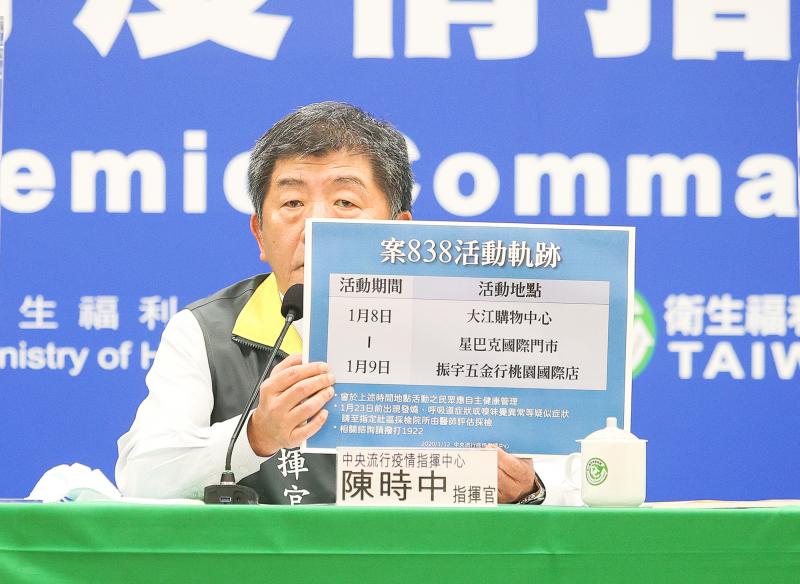Starting today, travelers who have been to South Africa or Eswatini within 14 days before entering Taiwan would be subject to centralized quarantine upon arrival, the Central Epidemic Command Center (CECC) said yesterday, as it confirmed Taiwan’s first person infected with a new variant of COVID-19 circulating in South Africa.
Minister of Health and Welfare Chen Shih-chung (陳時中), who heads the center, said that travelers arriving in Taiwan after midnight today and who have been to South Africa or Eswatini, including transit passengers, would be required to stay at a centralized quarantine facility.
They would be required to undergo two polymerase chain reaction (PCR) tests at the quarantine facility — when they arrive and upon completing the 14 days of quarantine — he said, adding that those who test negative would be allowed to return home for another seven days of self-health management.

Photo: CNA
Chen said that the special program adopts the same quarantine measures as the policy on travelers who have been to the UK within 14 days of entering Taiwan.
Travelers would not be charged for the tests or their stay at a centralized quarantine facility, he said, urging them to honestly report their health conditions to quarantine officers upon arrival.
He said that 38 specimens have since October last year been collected from COVID-19 patients with higher viral loads — those with PCR cycle threshold values of 27 or under — for genome sequence analysis.
Among them, five were confirmed to have been infected with a new variant first reported in the UK and one was infected with the variant circulating in South Africa, he added.
Chen said that more than 1.25 million confirmed cases of COVID-19 have been reported in South Africa — about 22,014 confirmed cases per 1 million population — and an average of 17,021 new cases have been reported daily in the past two weeks, accounting for more than 70 percent of the cases reported in Africa.
The South African variant has been reported in 12 other countries and is believed to spread faster than other strains of COVID-19, he said.
Separately, Chen said that four new imported cases were confirmed in Taiwan yesterday.
One of the cases is an Indian man in his 30s who arrived in Taiwan on Dec. 18 last year and stayed in a quarantine hotel until Jan. 2, Chen said.
He practiced self-health management until Friday last week, without showing symptoms, he said.
He underwent a paid test at a hospital on Monday and the result returned positive yesterday, he added.
Chen said the three other cases are Indonesian fishermen in their 20s and 30s who arrived in Taiwan between Dec. 27 and Dec. 30, and all stayed in quarantine hotels or centralized quarantine facilities, as they did not show symptoms.
They were tested on Monday and Tuesday, and the results returned positive yesterday, he said.

A Chinese aircraft carrier group entered Japan’s economic waters over the weekend, before exiting to conduct drills involving fighter jets, the Japanese Ministry of Defense said yesterday. The Liaoning aircraft carrier, two missile destroyers and one fast combat supply ship sailed about 300km southwest of Japan’s easternmost island of Minamitori on Saturday, a ministry statement said. It was the first time a Chinese aircraft carrier had entered that part of Japan’s exclusive economic zone (EEZ), a ministry spokesman said. “We think the Chinese military is trying to improve its operational capability and ability to conduct operations in distant areas,” the spokesman said. China’s growing

Taiwan yesterday denied Chinese allegations that its military was behind a cyberattack on a technology company in Guangzhou, after city authorities issued warrants for 20 suspects. The Guangzhou Municipal Public Security Bureau earlier yesterday issued warrants for 20 people it identified as members of the Information, Communications and Electronic Force Command (ICEFCOM). The bureau alleged they were behind a May 20 cyberattack targeting the backend system of a self-service facility at the company. “ICEFCOM, under Taiwan’s ruling Democratic Progressive Party, directed the illegal attack,” the warrant says. The bureau placed a bounty of 10,000 yuan (US$1,392) on each of the 20 people named in

Nine retired generals from Taiwan, Japan and the US have been invited to participate in a tabletop exercise hosted by the Taipei School of Economics and Political Science Foundation tomorrow and Wednesday that simulates a potential Chinese invasion of Taiwan in 2030, the foundation said yesterday. The five retired Taiwanese generals would include retired admiral Lee Hsi-min (李喜明), joined by retired US Navy admiral Michael Mullen and former chief of staff of the Japan Self-Defense Forces general Shigeru Iwasaki, it said. The simulation aims to offer strategic insights into regional security and peace in the Taiwan Strait, it added. Foundation chair Huang Huang-hsiung

PUBLIC WARNING: The two students had been tricked into going to Hong Kong for a ‘high-paying’ job, which sent them to a scam center in Cambodia Police warned the public not to trust job advertisements touting high pay abroad following the return of two college students over the weekend who had been trafficked and forced to work at a cyberscam center in Cambodia. The two victims, surnamed Lee (李), 18, and Lin (林), 19, were interviewed by police after landing in Taiwan on Saturday. Taichung’s Chingshui Police Precinct said in a statement yesterday that the two students are good friends, and Lin had suspended her studies after seeing the ad promising good pay to work in Hong Kong. Lee’s grandfather on Thursday reported to police that Lee had sent